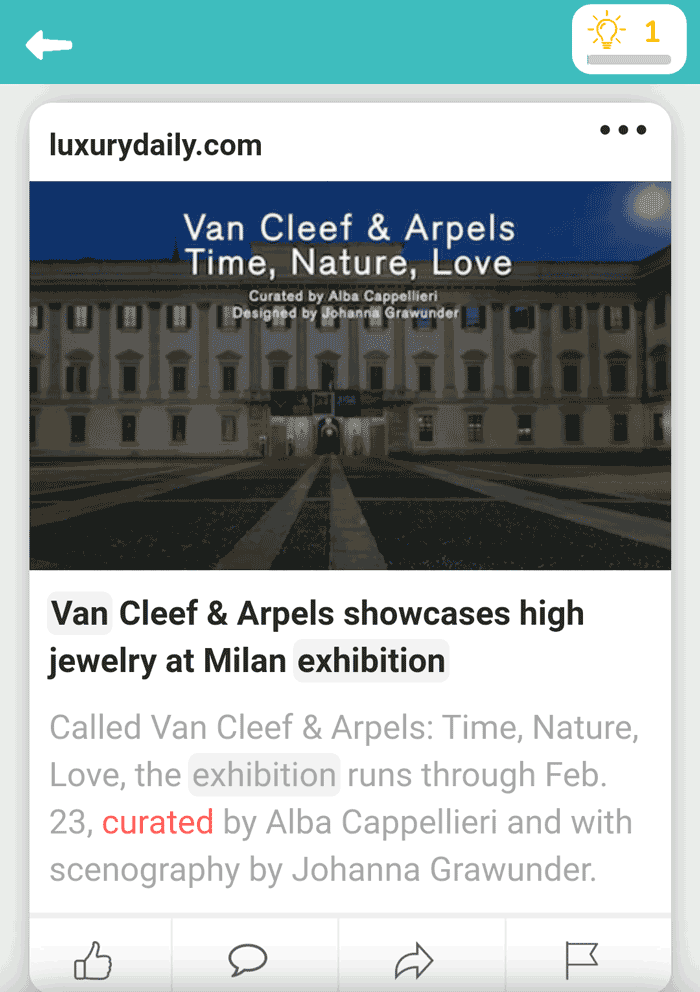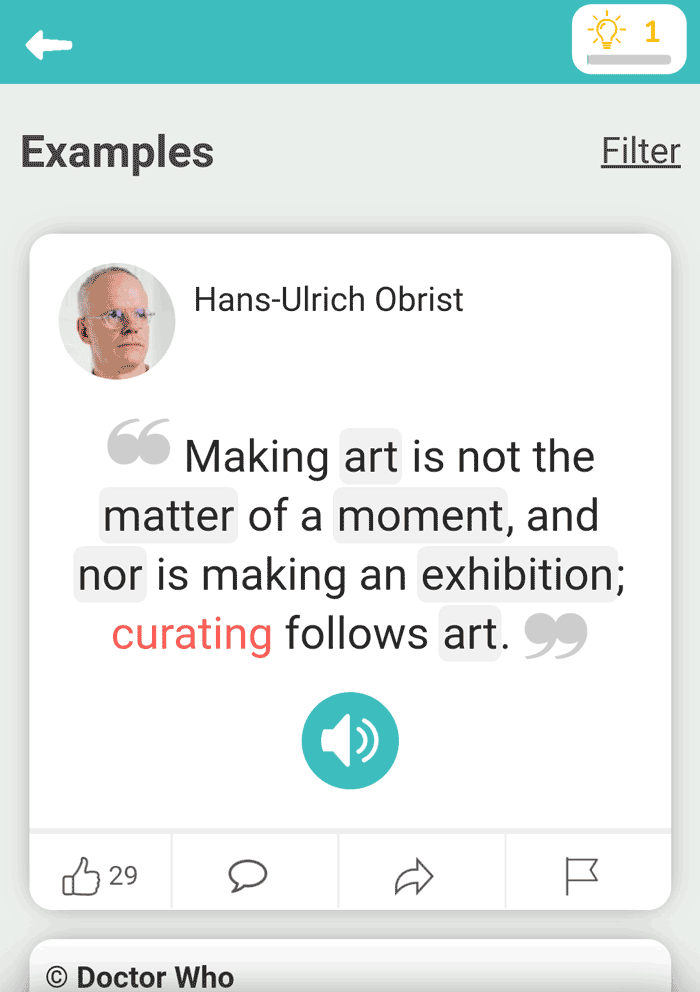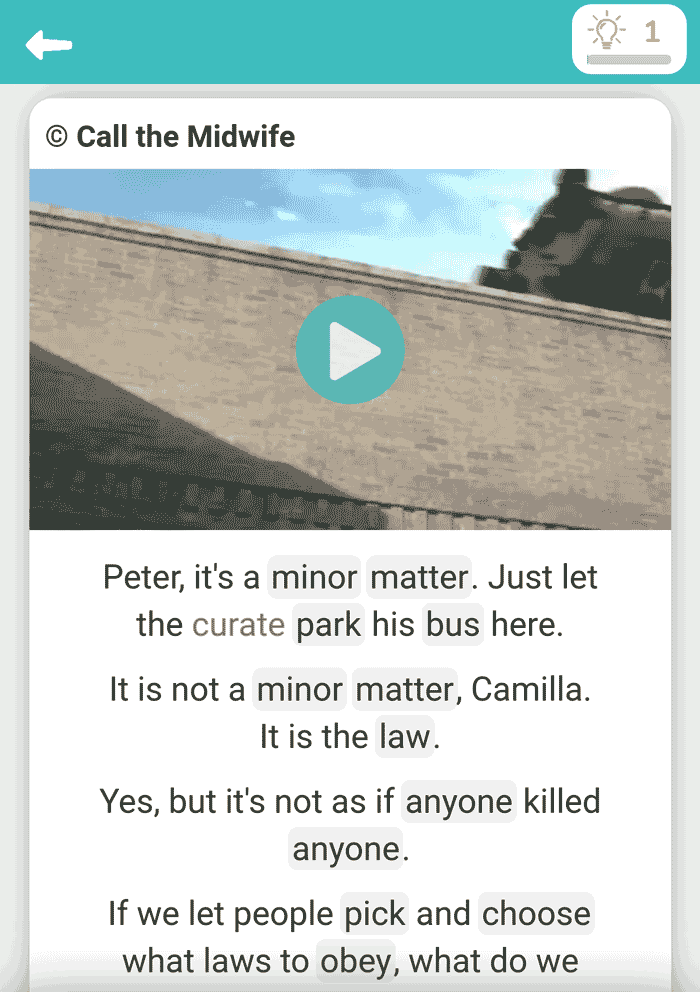The English adjective good is a word that is used often and which belongs to a very broad semantic field. In fact, there are an almost infinite number of situations in which this adjective could be used to indicate a positive quality or characteristic of something or someone. A brilliant writer can be called a “good writer” just as a caring mother could be considered a “good mother.”
To summarize, this term carries with it a great semantic potential since it can be used in diverse contexts and can be replaced by different synonyms depending on the meaning that you want to transmit. Also, the simple exclamation in English of “Good!” is very common.
To help you enrich your vocabulary and avoid repetition, today we will present 10 synonyms of this much-used adjective with more specific meanings.
1. Lovely
This looks a bit like good because it has a wide semantic field which can mean beautiful, nice, or fine, in reference to someone or something. It is often used to describe a person with a good character.
He is such a lovely guy!
Thank you, we had a lovely evening!
2. Tasty
This word literally means delicious. It is used in reference to foods to indicate that they taste good. In this context, it is a perfect synonym for good.
I had a very tasty chicken tikka at the new Indian restaurant.
Thank you for the tasty food!
3. Wholesome
The term was coined in the 12th century by the medieval monk Orm in his treatise “Ormulum.” It is composed of whole and some and literally means “beneficial to the soul.” It is used in reference to something or someone that give some kind of benefit, both physically or morally.
I always make sure that my children have wholesome meals.
Students need a good education but also wholesome entertainment.
4. Kind
In English, the expression “It is good of you…” is used to show that someone’s action has been kind and appropriate. In this context, a good synonym would be kind.
It has been kind of you to accompany us on the way.
It was kind of Danielle to come to the party even though she was tired.
5. Nice
This word has often changed its meaning over time. Originally, it had a negative connotation. In fact, it meant stupid or ignorant. Whereas today, it means pleasant or satisfactory. In reference to a person, nice can be translated as good or friendly.
We had a nice trip thanks to the good weather and the beautiful scenery.
John’s sister is a nice girl.
6. Fantastic
This word literally means very good. Sometimes, it is used as an exclamation to express surprise or approval.
“I passed my exam.”
“Fantastic!”
What a fantastic course!
7. Merry
This term, that we generally know as part of the greeting “Merry Christmas,” literally means happy. It is a bit old-fashioned and not used very often nowadays.
He wished me a Merry Christmas.
The students filled the air with merry songs and music.
8. Fine
This word of French origin is a perfect synonym for good. There are, however, different contexts in which the words may have different nuances of meaning. Take the context into account and consult your dictionary.
For example, if someone asks you “How are you doing?” you can respond with “I am doing good” or “I am fine.” In both cases, the person you are speaking with will understand what you want to say. That is good, but the adjective fine is more appropriate since good, in this case, could mean doing a good deed, while fine simply indicates being fine. Another expression that could be used in this case is “I am well.”
The flat is very small, which is fine for one person.
Mary said she will come a bit late tomorrow, which is fine for me as I need more time to organize everything.
9. Well
While this is generally used as an adverb, when used as an adjective it can serve as another synonym for good. In fact, well and good share the comparative form better and the superlative form best.
He is coping with the situation well.
Maria is doing well at university.
10. Suitable
This word means appropriate or adequate. It is a more specific adjective than good to use when you want to say that something or someone is good in a given situation or circumstance.
This cream is suitable for children with eczema.
For some people, finding a suitable mate is quite difficult.
Having a rich and varied vocabulary is a fundamental requirement for mastering a language. If you want to speak English properly and with a rich vocabulary, why not take an online course? ABA English puts a natural and effective method at your disposal with which you can learn English in a short time. The course includes 144 grammar video classes and the same number of short films as well as qualified native teachers.
Learning a foreign language isn’t always easy, especially when it comes to vocabulary. (I’ve been studying Japanese for years and still have trouble remembering words!) Luckily, there are many ways you can learn English vocabulary—and some of them are even a little fun!
In this guide, we go over the top five methods you can use to learn English words and give you a few tips on how to find English words to study.
Feature image: Nicolas Raymond/freestock.ca
Method 1: Make Flashcards
One of the most popular (and arguably best) ways to learn English vocabulary is to use flashcards. Each flashcard will have one English word written on the front and the word’s translation or definition on the back.
To study them, you’ll look at one side of a card and say the word on it in the opposite language before you look at the other side of the card (so if you were looking at the English side, for example, you’d say the word in your native language).
Flashcards are excellent resources because they help you memorize vocabulary words both quickly and effectively. They’re also customizable and reusable. Both paper and digital cards are available, and you can make your own cards, buy a pre-made deck, or download a deck online.
Pros
- Flashcards are easy to make. If you’re making paper cards, all you need are note cards (or small pieces of paper), a pencil or pen, and a list of the words you want to study. For digital cards, all you need is a computer and some software or a website to make them with.
- They’re interactive, especially if you make them yourself. With paper flashcards, you must write down all of the words you want to study as well as physically thumb through the cards, helping you concentrate on what each word means.
- Flashcard decks are easy to expand if you find new vocabulary you want to study. All you need to do is make a new flashcard and then add it to your deck—that’s it!
- They’re easy to randomize. Mixing up the order in which you study is essential to ensuring that you fully understand the meanings of the words you’re learning.
Cons
- Making flashcards is time consuming. Though not particularly difficult to make, flashcards can take a long time to create (regardless of whether you’re making paper or digital cards). Therefore, make sure you have ample time to set aside when making them.
- Paper flashcards are bulky and take up a lot of space. As a result, they’re often difficult to take places and use for on-the-go reviewing. If you’re hoping to brush up on your English vocabulary at places other than home, consider bringing only some of your cards with you or using a more compact resource such as a list (see method 2 below).
How to Use This Method Effectively
Flashcards must be used in specific ways in order to be effective for English-language learning. These methods differ depending on whether you’re studying with paper or digital flashcards.
Paper Flashcards
Paper flashcards are best for those who prefer more traditional study methods and want a break from computers and smartphones.
You can use any blank note cards to make your flashcards. Once you have some, start making your cards: with each card, write an English word (spelled correctly!) on the front and its translation in your native language (or an image of the word) on the back. You may also include on the front the word’s part of speech and/or a sample English sentence.
When finished, begin studying your flashcards using the «waterfall» method. With this method, you’ll study cards in subsets (smaller stacks of cards) and get to review harder English words more often than words you already know.
We explain the waterfall method in more detail in our guide to TOEFL vocabulary flashcards. However, to summarize briefly, here’s how it works:
#1: Go through all of your flashcards and make two piles: a «Know It» pile (with words you know) and a «Struggled» pile (with words you don’t know). Put the «Struggled» pile to the right of the «Know It» pile:
#2: Next, go through the cards in your «Struggled» pile one at a time. As you do this, make a second «Know It» pile for words you know (put this pile to the right of your original «Know It» pile). For words you don’t know, put them back in your «Struggled» pile.
#3: Continue this process of going through your «Struggled» pile and making new «Know It» piles until you only have four to five cards left in your «Struggled» pile. Here’s what your cards should look like:
#4: Now, work your way back up your «waterfall» of cards, starting with your «Struggled» pile. Go through this stack of cards until you know all of the words in it. You might have to go through it several times before you can remember all of the words.
#5: Combine the «Struggled» pile with the «Know It» pile directly to the left of it. Now, you’ll go through all of the words in both piles (combined as one) until you know all of these words.
#6: Repeat step 5 until you’ve gone through all of the cards in your deck, from right to left. You should now know the meanings of all of the English words on your flashcards!
Digital Flashcards
Some people (myself included!) prefer studying foreign languages with digital, or computerized, flashcards. These types of flashcards are accessible through software applications, websites, and/or apps.
While there are many free flashcard-making websites and programs available, my personal favorites are Anki and Memrise.
Anki is a free downloadable software through which you can make your own flashcards or download pre-made decks submitted by users. It uses spaced-repetition software (SRS) to show you difficult cards more often—similar to the waterfall method described above—making it convenient and easy to use.
Memrise, on the other hand, is a free language-learning website that offers tons of pre-made decks. It’s a little flashier and more game-like than Anki, so if you’d prefer a more «fun» way to learn English words, this is a great website (and app!) to try out.
Method 2: Make a Study List
Another helpful method is to make a list of all of the English-vocabulary words you want to learn. A list is different from flashcards in that it has all of the words you need to know in one place (instead of on separate cards). If you don’t want to deal with the hassle of using note cards, a study list is a solid option.
Pros
- The biggest benefit is that lists are easy to expand as you come across new words you want to know. For example, if you saw an English word you didn’t know on a sign at a restaurant, you can simply take out your list and write it down.
- You can use your list as a base for other study methods. Lists are helpful resources for identifying specific words to put on flashcards and use in vocabulary quizzes (see method 4).
- A list is less bulky than flashcards. With a list, you can keep track of dozens of words on a single sheet of paper, taking up far less space than hundreds of flashcards.
- It’s easy to make. All you need to do is write out each word, its part of speech (optional), and its meaning in your native language—nothing more!
Cons
- They’re pretty tedious and boring to work with. Unlike flashcards, which are highly interactive (you can make cards, flip through them, shuffle them, etc.), lists are static resources with few stimulating features.
- They make it difficult to randomize words. You’ll learn English words faster by sporadically mixing up the order in which you study them, but it’s a challenge to randomize words on lists since you can’t physically rearrange them as you can with flashcards.
How to Use This Method Effectively
Write your English words on the left side of a piece of paper, from top to bottom. I suggest numbering the words and adding their parts of speech, too (this is helpful because it teaches you how to use the words).
Then, on the right side of the paper, write the translation of each word in your native language (again, from top to bottom so that each translation aligns horizontally with its English equivalent). Here’s an example:
When you’re ready to start studying, get a separate sheet of paper (or your hand) to cover up the words on the right. You’ll then move this sheet down as you read and define each English word on the left. Make sure to say each word aloud in English before translating it into your native language.
Once you’ve defined a word, move your sheet of paper down to check that you’ve translated it correctly:
As you go through your list, consider marking any words you’re having trouble remembering. This way you’ll know right away which words you need to spend a little more time on than others.
Here are some additional ways you can use your list to learn English vocabulary:
- Study words in reverse. With this method, you’ll start at the bottom of your list and reveal words one at a time by moving your sheet up instead of down. This prevents you from simply memorizing the list in one particular order.
- Cover up the English side so that you must read the words in your native language and then translate them into English. Studying like this ensures you can come up with English equivalents for words all on your own.
These are both great methods to use after you’ve used the main method described above and are more familiar with the English vocabulary on your list.
Method 3: Write Out Words Repeatedly
If you want to practice spelling English words and like doing something physical as you study, writing out words is a solid option to try. With this method, you’ll write out each English word several times as you say it aloud.
If you’ve taken English courses in the past, you’ve probably had homework similar to this (I had to write out new words all the time for Japanese class in junior high and high school!). Although rote memorization isn’t everyone’s cup of tea, it can still be a highly effective way to learn English words.
Pros
- It’s interactive. Unlike flashcards and lists, which you merely look at to study, you’re always doing something when writing out words. If you’re the type who gets easily antsy and likes having something to do with your hands as you study, this is a good method to try.
- It helps you remember how to spell words. Flashcards and lists mainly teach you what a word means, but writing out a word (rather than looking at it briefly) makes it far easier to remember how it’s spelled.
Cons
- Writing out words repeatedly can feel monotonous. Despite being an effective method, rote memorization isn’t a particularly fun way to learn a language and gets tiresome fast.
- You can easily lose focus on a word as you write it again and again. To truly benefit from this method, you need to focus on what each word means and how it’s spelled. Unfortunately, the repetitive motions make it easy to fall into a zombie-like stupor.
How to Use This Method Effectively
The best way to write out words is to have a set number of times you’re going to write them out. Usually, 10 to 20 times is sufficient. Just make sure you’re actively thinking about each word as you write it out: look at the letters and how they’re arranged, pronounce it, and then define it.
I find that it’s helpful to note the translation of each word (in your native language) above your repetitions so that you don’t forget the meanings of any words and can more readily make associations between words in your language and in English.
Finally, I strongly suggest using this method with one of the two methods above (flashcards or a study list) to keep you from getting bored with your studies. Personally, I think the flashcard method is better as it’s more fun and doesn’t require you to make another long list of words.
Method 4: Take Vocabulary Quizzes
If you’re tired of flashcards and lists, vocabulary quizzes are a great way to test what you’ve learned and ensure you truly understand the meanings of English words.
Many English-word quizzes are available for free online. While some are traditional tests, others are more game-like; for example, you might find a matching game in which you have to match English words with their meanings (also in English!).
You can also make your own vocabulary quizzes using any of the resources above (flashcards, lists, etc.).
Pros
- They check your English progress by testing what you’ve learned. Quizzes let you see whether you truly know the English words you’ve studied and can use them fluently. If you fail a quiz, you’ll know exactly which words to work on more.
- Most online vocabulary quizzes are free. You can find tons of free, high-quality English-language quizzes and games on websites geared toward students, ESL learners, and general language learners.
Cons
- You can’t really learn words from scratch using quizzes alone. In other words, you’ll need to combine quizzes with one or more of the methods above so you can learn English vocabulary before testing out what you know.
- Some online vocabulary quizzes aren’t super high quality, so make sure you’re choosing ones that have words you are familiar with and no glitches or inaccuracies.
How to Use This Method Effectively
You have two options when it comes to English-vocabulary quizzes: look for pre-made quizzes online, or make your own.
Online Quizzes
If looking for quizzes online, I recommend starting with popular learning websites.
One option is Free Rice, whose «English Vocabulary» mode tests your knowledge of various high-level English words. Each question gives you one English word and four possible synonyms; the answer choices are also in English, so you’ll need to have a high English level in order to do well. For each question you get right, Free Rice donates 10 grains of rice to help end world hunger. So this is an excellent resource to use if you like the idea of helping others as you study!
Quizlet and Cram are two other websites you can use for free. Both offer flashcards, vocabulary lists, quizzes, and games. All you do is choose an English-vocabulary deck (or make your own) and then test yourself using the site’s «Test» feature.
Both websites’ «Test» features are similar to an actual language test: you get a variety of question types, from fill-in-the-blank and matching to multiple choice and true or false. With Cram, however, you can also choose how the system grades your answers. For example, you can make it so you don’t lose any points for errors in punctuation or capitalization.
Making Your Own Quizzes
The best way to make your own English-vocabulary quiz is to use flashcards (see method 1). With flashcards, you can easily randomize the words you’ll get and can’t predict which words will come up.
To make a quiz, get out a sheet of paper and number it 1-20 (or however many questions you want to have). Then, choose a flashcard at random. On your paper, write down the English word shown and (without flipping the card over) its translation or meaning in your native language.
Don’t check your answers right away by flipping the cards over—rather, wait until you’ve finished your entire quiz and then flip over the flashcards to score your test.
Method 5: Use Vocabulary Words in Conversation and Writing
Although the methods above are extremely useful for memorizing English words, you’ll never retain the words you learn unless you actually use them in conversation and writing. In short, context is key!
Pros
- You’ll learn more quickly how to use and say words you’ve studied. Although you should always say words aloud when you first learn them, using them in conversation (especially with native English speakers) is by far the best way to ensure you’re actually pronouncing and using them correctly.
- You’ll remember words better by using them in sentences, so always look for opportunities to use words you learn in both conversation and writing.
- You can get feedback when conversing with or writing to native English speakers. If you’re not sure whether you’re using a word correctly, you can ask others to give you feedback or explain how they themselves use specific words in English.
Cons
- It’s not always easy to find people to use English with. If you don’t live in an English-speaking country, native speakers can be hard to find, making it difficult to actively use the words you learn in conversation and writing.
- You need someone to check that you’re using the words correctly. If you’re using a word in writing, for example, but aren’t sure whether you’re using it correctly, you’ll need to ask a native speaker to check it for you. This can be tough to do, though, if you don’t have access to any native speakers.
- It can be intimidating to use new words with others. When speaking another language, we tend to rely on using only the words we know so we can avoid making any obvious mistakes. Unfortunately, this fear can ultimately hinder your ability to learn new words and use them with confidence.
How to Use This Method Effectively
If you’d like to use new English words in conversation, you’ll first need to find native English speakers or other English-language learners to practice speaking with. If you don’t live in an English-speaking country, try looking for English-language groups or clubs you can join in your area. Meetup, for example, is a handy website you can use to search for language groups around you (you can even create one yourself!).
Another option for English-speaking practice is to pay for video chat language lessons. Fees vary depending on the company you use and how many hours you want to practice. Some of the best websites to try include Live Lingua, Verbalplanet, and italki.
But what about writing in English? If you want to practice using words in writing, start keeping a journal and then have other people (preferably native English speakers) read your work to check that you’re correctly using new vocabulary.
My personal recommendation is a free website called Lang-8 on which you write various posts (such as journal entries, questions, stories, etc.) in your target language. Once you make a post, native English speakers then correct your entries and offer feedback. I’ve used this website many times before while studying Japanese, and it’s always been an extremely helpful resource!
You can also find a pen pal to write to in English—ideally, one who is a native English speaker and will write to you in your native language in return. This way you can have someone you know correct your English as you also correct his or her writing in your language!
How to Find English Vocabulary to Study: 3 Options
Now that we’ve given you a handful of methods you can use for learning English vocabulary, here are a few tips on where to actually find new English words to study.
#1: Write Down Words You Hear and Read
This is perhaps one of the most practical methods for learning English vocabulary, and one I often used while living in Japan. Basically, you’ll keep a running list of any unfamiliar English words you hear or read in both your day-to-day life and studies.
For listening, some of the best resources to use for finding new words are as follows:
- Everyday conversation: Ideally, you’ll converse mostly with native English speakers; that said, it’s better to practice speaking with other English-language learners than with nobody at all!
- English movies and TV shows: Avoid turning on the subtitles for your native language. Instead, if you’re having trouble picking out key words, turn on the English subtitles; this will help you identify new words more quickly and let you see how they’re spelled.
- English podcasts: Start by browsing this excellent list of English podcasts for language learners. Then, find the ones that sound most interesting to you and start listening!
- YouTube: Find English videos on topics you’re interested in (and turn on English subtitles if needed).
For reading, try looking for new English words to practice in these resources:
- Newspapers: There are tons of high-quality English-language newspapers online. Intermediate speakers can start with easier English-news websites such as VOA Learning English and BBC Learning English, whereas advanced learners can dive right into popular news outlets such as CNN and The New York Times.
- Websites: Look for websites and blogs dealing with any topic of interest to you. I suggest looking for prominent websites with lots of followers to ensure that the English they use is high quality.
- Books and stories: What better way to learn new words than through your favorite fairy tales? Intermediate learners can start with children’s books and short stories, while advanced learners can jump to novellas and novels. Graphic novels are also excellent resources!
Once you’ve found vocabulary words you want to study, open a Word document on your computer and start making a list. You can then add words to this list whenever you come across ones you don’t know in your listening and reading practice.
Make sure to include most or all of the following elements on your vocabulary list:
- The word in English (spelled correctly!)
- Its part of speech
- The translation/meaning of the word in your native language
- An example sentence using the word
You can then use this list as your primary study list or to help you make flashcards and quizzes.
#2: Look for Free Word Lists Online
Another helpful option is to seek out pre-made English word lists. Waiting to hear or read new English vocabulary isn’t always practical for language learners, but you can luckily find many free English-word lists online using the websites mentioned above (e.g., Quizlet, Cram, Memrise, etc.).
If you want to study upper-level academic vocabulary, try looking specifically for vocabulary lists targeting popular college-admission tests, such as the TOEFL, GRE, SAT, and ACT. At PrepScholar, we’ve gathered all high-frequency words for these exams and even created free downloadable flashcards for the TOEFL and GRE.
#3: Use a Textbook
If you like having structure in your vocabulary studies, consider buying an English-language textbook or workbook. These books should give you plenty of new vocabulary words to study as well as lots of relevant exercises to help you memorize and retain them. Oftentimes, textbooks come with a built-in dictionary, too!
Make sure you’re choosing a book that’s highly reviewed and geared toward your English level. You can also try looking at books that specifically target the TOEFL. Unfortunately, English-language textbooks cater mostly to beginner and intermediate learners, so if you’re an advanced English speaker, you’ll likely benefit more from the two options above.
There are many different ways to learn English vocabulary, from rote memorization and repetition to flashcards and quizzes. But in the end, it’s up to you to figure out which methods will work best for your learning style.
Here are some final pieces of advice to remember when studying English vocabulary:
- Don’t try to memorize every single word. English is believed to have the most words of any language, and I guarantee you won’t be able to learn all of them (even native English speakers don’t know every word!). Therefore, focus on memorizing the words you encounter most often. For everything else, use a dictionary!
- Ask for help if you get stuck. If you can’t remember the meaning of a particular word and don’t have a dictionary on hand, don’t be afraid to ask someone to define it for you. There’s nothing wrong with asking for help, and it’s certainly nothing to feel embarrassed about!
- Make studying English a habit. For a lot of people, it can be hard to find time to study English. But you’ll need a routine if you want to learn English words and actually remember them, so try to set aside at least 30 minutes every day to go through your study materials.
Good luck with your English studies!
What’s Next?
Need English-vocabulary words to study? Take a look at our list of 300+ high-frequency TOEFL words today! We also have created a free TOEFL vocabulary flashcards PDF here.
Want more tips on how to learn English? Start with our guide to learning English and figuring out your language goals. Then, move on to our article on the best English-language games you can play, with others or by yourself!
Planning to take the TOEFL? Then you’ll definitely want to read our expert tips on how to prepare for this tricky English test.
Taking the TOEFL and need to boost your score? We have the world’s leading TOEFL course.
Built by world-class instructors from Harvard and MIT, our TOEFL course offers individual review, interactive lessons, and realistic online practice, at an affordable price! It’s the fastest way to get your target TOEFL score. And the best part? You can try it out for 5 days absolutely free of charge!
Have friends who also need help with test prep? Share this article!
About the Author
Hannah received her MA in Japanese Studies from the University of Michigan and holds a bachelor’s degree from the University of Southern California. From 2013 to 2015, she taught English in Japan via the JET Program. She is passionate about education, writing, and travel.
Number 1: Certainly
Certainly is a great alternative to okay or no problem, which are used way too much in English.
So the next time your boss asks, “Can you get that document to me by the end of the afternoon?”
You should respond, “Certainly!”
Number 2: Modify
Things at work are always changing. The problem is many people don’t like change, so the word ‘change’ doesn’t help them feel good or make you look good.
An easy upgrade here, that can make you sound smart is the word ‘modify’. This means it is a small change, so it can sound less terrifying.
Instead of saying:
‘We need to change what we are doing here because the customer isn’t happy.’
You can use the word modify and say:
‘Modifying our approach would make the customer happier.’
Number 3: Complications
There is a word that puts fear into almost anyone at work, and that word is ‘problem’.
When someone walks into the office and says ‘there is a problem’, no one feels great! So, to sound less negative and impress a little more, try a fancier word like ‘complication’.
Rather than:
There is a problem with the order and it is running really late.
Say:
There have been some complications and the order’s been delayed.
Number 4: Sensational
Don’t get me wrong, awesome is a fabulous word. That is exactly why we use it so much.
But at work, saying this is awesome and that is awesome all the time, gets old really quickly and the word loses it power from being overused.
So, it is definitely a good move to change it up and use some synonyms for ‘awesome’.
‘Sensational’ is a good place to start, it has the same meaning, that something is really great or wonderful, and it sounds particularly positive.
If a colleague offers to buy you coffee, what could you say? That would be sensational!!
Number 5: Elaborate
Elaborate is a great verb that just means to give more details.
So instead of saying to your colleague, “what do you mean?”
You can say, “Could you elaborate?” It’s much more polite and professional.
Number 6: Leverage
Companies love the word leverage. If you talk about this at work, you will definitely impress.
It really means getting an advantage, so you could say to your colleague: Modifying our approach could give us real leverage here (which means, if we change what we are doing we could get an advantage). But using leverage sounds SO much better, doesn’t it?
Number 7: Ramifications
The fact is, at work we sometimes have to talk about bad things that have happened or might happen. So why not take that opportunity to sound super smart while doing it?
The word you need in that case is ‘ramifications’ which means those bad things that happen that we didn’t want or didn’t expect.
We often use this word together with ‘potential’.
For instance, when considering an idea at work, if you want to suggest the team thinks about the possibility for unexpected or unwanted negative effects you could say:
“We may need to consider the ramifications before proceeding.”
Number 8: Perplexing
Sometimes things are definitely confusing at work.
Perhaps a customer has done something weird, maybe the files you just put on your desk have disappeared… or that email your boss sent didn’t show up in your inbox. 😬
In these instances it is the perfect time to sound smart. Instead of saying, ‘That’s weird!’ or ‘I’m confused’, use ‘That’s perplexing’.
You are simply saying how confusing something is, but you are sounding so impressive doing it!
Number 9: Straightforward
Everyone likes things at work to be easy.
We hope that a project will be easy, that preparing for the presentation will be easy and that meeting our deadlines will be easy.
Instead of saying ‘easy’, impress with your vocabulary and say ‘straightforward’.
For example:
“Working with this client should be quite straightforward, they have clear goals and timelines.”
Number 10: Like (a word to AVOID)
It is time to talk about the all important overused filler that we all need to stop using so much. The word ‘like’.
This word creeps into way too many sentences. I have heard sentences where it pops up 3, 4 or even 5 times!
👉At work it sounds unprofessional, especially when used as a filler. So, instead of throwing ‘like’ in there, just take a little pause and think clearly about what you want to say.
There are some great alternatives for when we are using ‘like’ to introduce information. For instance:
Don’t say: There are lots of opportunities like this for our product.
Do say: There are plenty of opportunities such as this for our sensational product.
Other options include: for instance or specifically.
❤️love this lesson? Be sure to check out these similar lessons on advanced vocabulary:
10 Collocations with the Word Say
Collocations with the Word Think
Visit my full Advanced Vocabulary playlist
This post comes from my experience of adding more than 8,000 words and phrases to my vocabulary in a way that I can actually use them on the fly in my speech and writing. Some words, especially those that I haven’t used for long time, may elude me, but overall the recall & use works quite well.
That’s why you build vocabulary, right? To use in speech and writing. There are no prizes for building list of words you can’t use. (The ultimate goal of vocabulary-building is to use words in verbal communication where you’ve to come up with an appropriate word in split second. It’s not to say that it’s easy to come up with words while writing, but in writing you can at least afford to think.)
This post also adopts couple of best practices such as
- Spaced repetition,
- Deliberate Practice,
- Begin with end in mind, and
- Build on what you already know
In this post, you’ll learn how you too can build such vocabulary, the one you can actually use. However, be warned. It’s not easy. It requires consistent work. But the rewards are more than worth the squeeze.
Since building such vocabulary is one of the most challenging aspects of English Language, you’ll stand out in crowd when you use precise words and, the best part, you can use this sub-skill till you’re in this world, long after you retire professionally. (Doesn’t this sound so much better when weighed against today’s reality where most professional skills get outdated in just few years?)
You may have grossly overestimated the size of your vocabulary
Once your understand the difference between active and passive vocabulary, you’ll realize that size of your vocabulary isn’t what you think it to be.
Active vs. Passive vocabulary
Words that you can use in speech and writing constitute your active vocabulary (also called functional vocabulary). You, of course, understand these words while reading and listening as well. Think of words such as eat, sell, drink, see, and cook.
But how about words such as munch, outsmart, salvage, savagery, and skinny? Do you use these words regularly while speaking and writing? Unlikely. Do you understand meaning of these words while reading and listening? Highly likely. Such words constitute your passive vocabulary (also called recognition vocabulary). You can understand these words while reading and listening, but you can’t use them while speaking and writing.
Your active vocabulary is a tiny subset of your passive vocabulary:
(While the proportion of the two inner circles – active and passive vocabulary – bears some resemblance to reality, the outer rectangle is not proportionate because of paucity of space. In reality, the outer rectangle is much bigger, representing hundreds of thousands of words.)
Note: Feel free to use the above and other images in the post, using the link of this post for reference/attribution.
Many mistakenly believe that they’ve strong vocabulary because they can understand most words when reading and listening. But the real magic, the real use of vocabulary is when you use words in speech and writing. If you evaluate your vocabulary against this yardstick – active vs. passive – your confidence in your vocabulary will be shaken.
Why build vocabulary – a small exercise?
You would be all too aware of cases where people frequently pause while speaking because they can’t think of words for what they want to say. We can easily spot such extreme cases.
What we fail to spot, however, are less extreme, far more common cases where people don’t pause, but they use imprecise words and long-winding explanations to drive their message.
Example 1
The bridge was destroyed (or broken) by the flooded river.
Vs.
The bridge was washed away by the flooded river.
Although both convey the message, the second sentence stands out because of use of precise phrase.
Example 2
What word(s) best describe what’s happening in the picture below?
Image source
‘Dropped’
Not the best response.
A better word is ‘emptied’. Even ‘dumped’ is great.
A crisp description of the above action would be: “The dumper emptied (or dumped) the stones on the roadside.”
Example 3
What about this?
Image source
‘Took out grapes’.
No.
‘Plucked grapes’ is far better.
If you notice, these words – wash away, empty, dump, and pluck – are simple. We can easily understand them while reading and listening, but rarely use them (with the possible exception of empty) in speech or writing. Remember, active vs. passive vocabulary?
If you use such precise words in your communication you’ll stand out in crowd.
Little wonder, studies point to a correlation between strength of vocabulary and professional success. Earl Nightingale, a renowned self-help expert and author, in his 20-year study of college graduates found:
Without a single exception, those who had scored highest on the vocabulary test given in college, were in the top income group, while those who had scored the lowest were in the bottom income group.
He also refers to a study by Johnson O’Connor, an American educator and researcher, who gave vocabulary tests to executive and supervisory personnel in 39 large manufacturing companies. According to this study:
Presidents and vice presidents averaged 236 out of a possible 272 points; managers averaged 168; superintendents, 140; foremen, 114; floor bosses, 86. In virtually every case, vocabulary correlated with executive level and income.
Though there are plenty of studies linking professional success with fluency in English overall, I haven’t come across any study linking professional success with any individual component – grammar and pronunciation, for example – of English language other than vocabulary.
You can make professional success a motivation to improve your active vocabulary.
Let’s dive into the tactics now.
(In the spirit of the topic of this section, I’ve highlighted words that I’ve shifted from my passive to active vocabulary in red font. I’ve done this for only this section, lest the red font become too distracting.)
Almost all of us build vocabulary through the following two-step process:
Step 1: We come across new words while reading and listening. Meanings of many of these words get registered in our brains – sometimes vaguely, sometimes precisely – through the context in which we see these words. John Rupert Firth, a leading figure in British linguistics during the 1950s, rightly said, “You shall know a word by the company it keeps.”
Many of these words then figure repeatedly in our reading and listening and gradually, as if by osmosis, they start taking roots in our passive vocabulary.
Step 2: We start using some of these words in our speech and writing. (They are, as discussed earlier, just a small fraction of our passive vocabulary.) By and large, we stay in our comfort zones, making do with this limited set of words.
Little wonder, we add to our vocabulary in trickle. In his book Word Power Made Easy, Norman Lewis laments the tortoise-like rate of vocabulary-building among adults:
Educational testing indicates that children of ten who have grown up in families in which English is the native language have recognition [passive] vocabularies of over twenty thousand words.
And that these same ten-year-olds have been learning new words at a rate of many hundreds a year since the age of four.
In astonishing contrast, studies show that adults who are no longer attending school increase their vocabularies at a pace slower than twenty-five to fifty words annually.
Adults improve passive vocabulary at an astonishingly meagre rate of 25-50 words a year. The chain to acquire active vocabulary is getting broken at the first step itself – failure to read or listen enough (see Step 1 we just covered). Most are not even reaching the second step, which is far tougher than the first. Following statistic from National Spoken English Skills Report by Aspiring Minds (sample of more than 30,000 students from 500+ colleges in India) bears this point:
Only 33 percent know such simple words! They’re not getting enough inputs.
Such vocabulary-acquisition can be schematically represented as:
The problem here is at both the steps of vocabulary acquisition:
- Not enough inputs (represented by funnel filled only little) and
- Not enough exploration and use of words to convert inputs into active vocabulary (represented by few drops coming out of the funnel)
Here is what you can do to dramatically improve your active vocabulary:
1. Get more inputs (reading and listening)
That’s a no-brainer. The more you read,
- the more new words you come across and
- the more earlier-seen words get reinforced
If you’ve to prioritize between reading and listening purely from the perspective of building vocabulary, go for more reading, because it’s easier to read and mark words on paper or screen. Note that listening will be a more helpful input when you’re working on your speaking skills.
So develop the habit to read something 30-60 minutes every day. It has benefits far beyond just vocabulary-building.
If you increase your inputs, your vocabulary-acquisition funnel will look something like:
More inputs but no other steps result in larger active vocabulary.
2. Gather words from your passive vocabulary for deeper exploration
The reading and listening you do, over months and years, increase the size of your passive vocabulary. There are plenty of words, almost inexhaustible, sitting underutilized in your passive vocabulary. Wouldn’t it be awesome if you could move many of them to your active vocabulary? That would be easier too because you don’t have to learn them from scratch. You already understand their meaning and usage, at least to some extent. That’s like plucking – to use the word we’ve already overused – low hanging fruits.
While reading and listening, note down words that you’re already familiar with, but you don’t use them (that is they’re part of your passive vocabulary). We covered few examples of such words earlier in the post – pluck, dump, salvage, munch, etc. If you’re like most, your passive vocabulary is already large, waiting for you to shift some of it to your active vocabulary. You can also note down completely unfamiliar words, but only in exceptional cases.
To put what I said in the previous paragraph in more concrete terms, you may ask following two questions to decide which words to note down for further exploration:
- Do you understand the meaning of the word from the context of your reading or listening?
- Do you use this word while speaking and writing?
If the answer is ‘yes’ to the first question and ‘no’ to the second, you can note down the word.
3. Explore the words in an online dictionary
Time to go a step further than seeing words in context while reading.
You need to explore each word (you’ve noted) further in a dictionary. Know its precise meaning(s). Listen to pronunciation and speak it out loud, first individually and then as part of sentences. (If you’re interested in the topic of pronunciation, refer to the post on pronunciation.) And, equally important, see few sentences where the word has been used.
Preferably, note down the meaning(s) and few example sentences so that you can practice spaced repetition and retain them for long. Those who do not know what spaced repetition is, it is the best way to retain things in your long-term memory. There are number of options these days to note words and other details about them – note-taking apps and good-old word document. I’ve been copying-pasting on word document and taking printouts. For details on how I practiced spaced repetition, refer to my experience of adding more than 8,000 words to my vocabulary.
But why go through the drudgery of noting down – and going through, probably multiple times – example sentences? Why not just construct sentences straight after knowing the meaning of the word?
Blachowicz, Fisher, Ogle, and Watts-Taffe, in their paper, point out the yawning gap between knowing the meaning of words and using them in sentences:
Research suggests that students are able to select correct definitions for unknown words from a dictionary, but they have difficulty then using these words in production tasks such as writing sentences using the new words.
If only it was easy. It’s even more difficult in verbal communication where, unlike in writing, you don’t have the luxury of pausing and recalling appropriate words.
That’s why you need to focus on example sentences.
Majority of those who refer dictionary, however, restrict themselves to meaning of the word. Few bother to check example sentences. But they’re at least as much important as meaning of the word, because they teach you how to use words in sentences, and sentences are the building blocks of speech and writing.
If you regularly explore words in a dictionary, your vocabulary-acquisition funnel will look something like:
More inputs combined with exploration of words result in even larger active vocabulary.
After you absorb the meaning and example sentences of a word, it enters a virtuous cycle of consolidation. The next time you read or listen the word, you’ll take note of it and its use more actively, which will further reinforce it in your memory. In contrast, if you didn’t interact with the word in-depth, it’ll pass unnoticed, like thousands do every day. That’s cascading effect.
4. Use them
To quote Maxwell Nurnberg and Morris Rosenblum from their book All About Words:
In vocabulary building, the problem is not so much finding new words or even finding out what they mean. The problem is to remember them, to fix them permanently in your mind.
For you can see that if you are merely introduced to words, you will forget them as quickly as you forget the names of people you are casually introduced to at a crowded party – unless you meet them again or unless you spend some time with them.
This is the crux. Use it or lose it.
Without using, the words will slowly slip away from your memory.
Without using the words few times, you won’t feel confident using them in situations that matter.
If you use the words you explored in dictionary, your vocabulary-acquisition funnel will look something like:
More inputs combined with exploration of words and use of them result in the largest active vocabulary.
Here is a comparison of the four ways in which people acquire active vocabulary:
The big question though is how to use the words you’re exploring. Here are few exercises to accomplish this most important step in vocabulary-building process.
Vocabulary exercises: how to use words you’re learning
You can practice these vocabulary activities for 10-odd minutes every day, preferably during the time you waste such as commuting or waiting, to shift more and more words you’ve noted down to your active vocabulary. I’ve used these activities extensively, with strong results to boot.
1. Form sentences and speak them out during your reviews
When you review the list of words you’ve compiled, take a word as cue without looking at its meaning and examples, recall its meaning, and, most importantly, speak out 4-5 sentences using the word. It’s nothing but a flashcard in work. If you follow spaced repetition diligently, you’ll go through this process at least few times. I recommend reading my experience of building vocabulary (linked earlier) to know how I did this part.
Why speaking out, though? (If the surroundings don’t permit, it can be whisper as well.)
Speaking out the word as part of few sentences will serve the additional purpose of making your vocal cords accustomed to new words and phrases.
2. Create thematic webs
When reviewing, take a word and think of other words related to that word. Web of words on a particular theme, in short, and hence the name ‘thematic web’. These are five of many, many thematic webs I’ve actually come up in my reviews:
(Note: Name of the theme is in bold. Second, where there are multiple words, I’ve underlined the main word.)
A. Food
If I come across the word ‘gourmet’ in my review, I’ll also quickly recall all the words related with food: tea strainer, kitchen cabinet, sink, dish cloth, wipe dishes, rinse utensils, immerse beans in water, simmer, steam, gourmet food, sprinkle salt, spread butter, smear butter, sauté, toss vegetables, and garnish the sweet dish
Similarly, for other themes:
B. Health
Prognosis, recuperate, frail, pass away, resting place, supplemental air, excruciating pain, and salubrious
C. Showing off
Showy, gaudy, extravaganza, over the top, ostentatious, and grandstanding
D. Crowd behavior
Restive, expectant, hysteria, swoon, resounding welcome, rapturous, jeer, and cheer
E. Rainfall
Deluge, cats and dogs, downpour, cloudburst, heavens opened, started pouring, submerged, embankment, inundate, waterlogged, soaked to the skin, take shelter, run for a cover, torrent, and thunderbolt
(If you notice, words in a particular theme are much wider in sweep than just synonyms.)
It takes me under a minute to complete dozen-odd words in a theme. However, in the beginning, when you’re still adding to your active vocabulary in tons, you’ll struggle to go beyond 2-3 simple words when thinking out such thematic lists. That’s absolutely fine.
Why thematic web, though?
Because that’s how we recall words when speaking or writing. (If you flip through Word Power Made Easy by Norman Lewis, a popular book on improving vocabulary, you’ll realize that each of its chapters represents a particular idea, something similar to a theme.) Besides, building a web also quickly jogs you through many more words.
3. Describe what you see around
In a commute or other time-waster, look around and speak softly an apt word in a split second for whatever you see. Few examples:
- If you see grass on the roadside, you can say verdant or luxurious.
- If you see a vehicle stopping by the roadside, you can say pull over.
- If you see a vehicle speeding away from other vehicles, you can say pull away.
- If you see a person carrying a load on the road side, you can say lug and pavement.
Key is to come up with these words in a flash. Go for speed, not accuracy. (After all, you’ll have similar reaction time when speaking.) If you can’t think of an appropriate word for what you see instantaneously – and there will be plenty in the beginning – skip it.
This vocabulary exercise also serves an unintended, though important, objective of curbing the tendency to first think in the native language and then translating into English as you speak. This happens because the spontaneity in coming up with words forces you to think directly in English.
Last, this exercise also helps you assess your current level of vocabulary (for spoken English). If you struggle to come up with words for too many things/ situations, you’ve job on your hands.
4. Describe what one person or object is doing
Another vocabulary exercise you can practice during time-wasters is to focus on a single person and describe her/ his actions, as they unfold, for few minutes. An example:
He is skimming Facebook on his phone. OK, he is done with it. Now, he is taking out his earphones. He has plugged them into his phone, and now he is watching some video. He is watching and watching. There is something funny there in that video, which makes him giggle. Simultaneously, he is adjusting the bag slung across his shoulder.
The underlined words are few of the new additions to my active vocabulary I used on the fly when focusing on this person.
Feel free to improvise and modify this process to suit your unique conditions, keeping in mind the fundamentals such as spaced repetition, utilizing the time you waste, and putting what you’re learning to use.
To end this section, I must point out that you need to build habit to perform these exercises for few minutes at certain time(s) of the day. They’re effective when done regularly.
Why I learnt English vocabulary this way?
For few reasons:
1. I worked backwards from the end result to prepare for real-world situations
David H. Freedman learnt Italian using Duolingo, a popular language-learning app, for more than 70 hours in the buildup to his trip to Italy. A week before they were to leave for Rome, his wife put him to test. She asked how would he ask for his way from Rome airport to the downtown. And how would he order in a restaurant?
David failed miserably.
Reason?
He had become a master of multiple-choice questions in Italian, which had little bearing on the real situations he would face.
We make this mistake all the time. We don’t start from the end goal and work backwards to design our lessons and exercises accordingly. David’s goal wasn’t to pass a vocabulary test. It was to strike conversation socially.
Coming back to the topic of vocabulary, learning meanings and examples of words in significant volume is a challenge. But a much bigger challenge is to recall an apt word in split second while speaking. (That’s the holy grail of any vocabulary-building exercise, and that’s the end goal we want to achieve.)
The exercises I described earlier in the post follow the same path – backwards from the end.
2. I used proven scientific methods to increase effectiveness
Looking at just a word and recalling its meaning and coming up with rapid-fire examples where that word can be used introduced elements of deliberate practice, the fastest way to build neural connection and hence any skill. (See the exercises we covered.) For the uninitiated, deliberate practice is the way top performers in any field practice.
Another proven method I used was spaced repetition.
3. I built on what I already knew to progress faster
Covering mainly passive vocabulary has made sure that I’m building on what I already know, which makes for faster progress.
Don’t ignore these when building vocabulary
Keep in mind following while building vocabulary:
1. Use of fancy words in communication make you look dumb, not smart
Don’t pick fancy words to add to your vocabulary. Use of such words doesn’t make you look smart. It makes your communication incomprehensible and it shows lack of empathy for the listeners. So avoid learning words such as soliloquy and twerking. The more the word is used in common parlance, the better it is.
An example of how fancy words can make a piece of writing bad is this review of movie, which is littered with plenty of fancy words such as caper, overlong, tomfoolery, hectoring, and cockney. For the same reason, Shashi Tharoor’s Word of the Week is not a good idea. Don’t add such words to your vocabulary.
2. Verbs are more important than nouns and adjectives
Verbs describe action, tell us what to do. They’re clearer. Let me explain this through an example.
In his book Start with Why, Simon Sinek articulates why verbs are more effective than nouns:
For values or guiding principles to be truly effective they have to be verbs. It’s not ‘integrity’, it’s ‘always do the right thing’. It’s not ‘innovation’, it’s ‘look at the problem from a different angle’. Articulating our values as verbs gives us a clear idea… we have a clear idea of how to act in any situation.
‘Always do the right thing’ is better than ‘integrity’ and ‘look at the problem from a different angle’ is better than ‘innovation’ because the former, a verb, in each case is clearer.
The same (importance of verb) is emphasized by L. Dee Fink in his book Creating Significant Learning Experiences in the context of defining learning goals for college students.
Moreover, most people’s vocabulary is particularly poor in verbs. Remember, the verbs from the three examples at the beginning of the post – wash away, dump, and pluck? How many use them? And they’re simple.
3. Don’t ignore simple verbs
You wouldn’t bother to note down words such as slip, give, and move because you think you know them inside out, after all you’ve been using them regularly for ages.
I also thought so… until I explored few of them.
I found that majority of simple words have few common usages we rarely use. Use of simple words for such common usages will stand your communication skills out.
An example:
Slip
a. To slide suddenly or involuntarily as on a smooth surface: She slipped on the icy ground.
b. To slide out from grasp, etc.: The soap slipped from my hand.
c. To move or start gradually from a place or position: His hat slipped over his eyes.
d. To pass without having been acted upon or used: to let an opportunity slip.
e. To pass quickly (often followed by away or by): The years slipped by.
f. To move or go quietly, cautiously, or unobtrusively: to slip out of a room.
Most use the word in the meaning (a) and (b), but if you use the word for meaning (c) to (f) – which BTW is common – you’ll impress people.
Another example:
Unmanned
a. Without the physical presence of people in control: an unmanned spacecraft.
b. Hovering near the unmanned iPod resting on the side bar, stands a short, blond man.
c. Political leaders are vocal about the benefits they expect to see from unmanned aircraft.
Most use the word unmanned with a moving object such as an aircraft or a drone, but how about using it with an iPod (see (b) above).
4. Don’t ignore phrasal verbs. Get at least common idioms. Proverbs… maybe
4.1 Phrasal verbs
Phrasal verbs are verbs made from combining a main verb and an adverb or preposition or both. For example, here are few phrasal verbs of verb give:
Give away
Give back
Give in
Give out
Give over
Give up
We use phrasal verbs aplenty:
I went to the airport to see my friend off.
He could see through my carefully-crafted ruse.
I took off my coat.
The new captain took over the reins of the company on June 25.
So, don’t ignore them.
Unfortunately, you can’t predict the meaning of a phrasal verb from the main verb. For example, it’s hard to guess the meaning of take over or take off from take. You’ve to learn each phrasal verb separately.
4.2 Idioms
What about idioms?
Compared to phrasal verbs, idioms are relatively less used, but it’s good to know the common ones. To continue the example of word give, here are few idioms derived from it:
Give and take
Give or take
Give ground
Give rise to
Give way
Want a list of common idioms? It’s here: List of 200 common idioms.
4.3 Proverbs
Proverbs are popular sayings that provide nuggets of wisdom. Example: A bird in hand is worth two in the bush.
Compared to phrasal verbs and idioms, they’re much less used in common conversation and therefore you can do without them.
For the motivated, here is a list of common proverbs: List of 200 common proverbs.
5. Steal phrases, words, and even sentences you like
If you like phrases and sentences you come across, add them to your list for future use. I do it all the time and have built a decent repository of phrases and sentences. Few examples (underlined part is the key phrase):
The bondholders faced the prospect of losing their trousers.
The economy behaved more like a rollercoaster than a balloon. [Whereas rollercoaster refers to an up and down movement, balloon refers to a continuous expansion. Doesn’t such a short phrase express such a profound meaning?]
Throw enough spaghetti against the wall and some of it sticks.
You need blue collar work ethic to succeed in this industry.
He runs fast. Not quite.
Time to give up scalpel. Bring in hammer.
Note that you would usually not find such phrases in a dictionary, because dictionaries are limited to words, phrasal verbs, idioms, and maybe proverbs.
6. Commonly-used nouns
One of my goals while building vocabulary has been to learn what to call commonly-used objects (or nouns) that most struggle to put a word to.
To give an example, what would you call the following?
Image source
Answer: Tea strainer.
You would sound far more impressive when you say, “My tea strainer has turned blackish because of months of filtering tea.”
Than when you say, “The implement that filters tea has turned blackish because of months of filtering tea.”
What do you say?
More examples:
Saucer (We use it every day, but call it ‘plate’.)
Bed linen
Blinds
Straight/ wavy/ curly hair
Corner shop
Corkscrew
Cry-baby
Door knob
Summary
I’ll end with a brief reference to the UIDAI project that is providing unique biometric ID to every Indian. This project, launched in 2009, has so far issued a unique ID (popularly called Aadhaar card) to more than 1.1 billion people. The project faced many teething problems and has been a one big grind for the implementers. But once this massive data of billion + people was collected, so many obstinate, long-standing problems are being eased using this data, which otherwise would’ve been difficult to pull off. It has enabled faster delivery of scores of government and private services, checked duplication on many fronts, and brought in more transparency in financial and other transactions, denting parallel economy. There are many more. And many more are being conceived on top of this data.
At some level, vocabulary is somewhat similar. It’ll take effort, but once you’ve sizable active vocabulary, it’ll strengthen arguably the most challenging and the most impressive part of your communication. And because it takes some doing, it’s not easy for others to catch up.

No one can deny it.
The size of your vocabulary matters.
Having a large vocabulary allows you to understand and communicate in English (almost) like a native.
So in this guide, you will learn 4 proven ways to increase your English vocabulary.
This guide will teach you:
- How to learn words deeply.
- How to increase vocabulary in a short time.
- How to expand your writing and speaking vocabulary.
- How to ensure you don’t forget words you learn.
Of course, if you want to accomplish these things, you need multiple methods.
Here are the 4 best ways to improving English vocabulary:
- Read and listen to English regularly
- Use vocabulary apps
- Imitate native speakers
- Prefer to use English over your native language
In this article, we’ll examine these strategies in great detail.
This guide is long. If you just want a summary of what to do, click here to jump to the step-by-step action plan.
Now let’s begin.
Method #1: Read and Listen to English Regularly
Reading and listening are the most powerful duo in English learning.
The key is to do it as much as possible. I recommend you do it during mindless activities like commuting to work or waiting at the airport. It’s a great way to turn boring activities into productive time.
You can read or listen to anything you want, but the best place is to start are things you find interesting. (For example, if you’re a fitness fanatic, you may read English books about exercise, diet, and nutrition.)
Or you can start with these two resources:
- Books to read to improve your English
- English listening materials (free download)
The Pros of Reading and Listening
Let’s look at the advantages of this method. (We’ll discuss the limitation later.)
Pro #1: It’s a powerful way to learn word usage
Some students learn English words by simply memorizing their meanings.
DISCUSS (dəˈskəs)
Talk about (something) with another person.
SECRET (ˈsēkrit, ˈsikrɪt)
Something that is kept unknown or unseen by others.
There’s a problem with this approach; it doesn’t tell you how to use words correctly in a sentence.
On the other hand, when you read or listen to English, you learn not just the meanings, but also how the words are used in a sentence.
We discussed the problem until 3 PM.
Leaning words in context (with surrounding words) like this is effective.
Suppose that presently you use the word ‘discuss’ incorrectly, so you tend to say, “discuss about (the topic),” instead of “discuss (the topic).”
How do you fix this mistake?
The answer is a lot of reading and listening. If you see and hear native speakers use the word discuss enough times, eventually you’ll get used to the correct usage, and “discuss something” will start to feel right while “discuss about something” will start to feel wrong.
Let’s look at another example.
Which of the two sentences below is correct?
- I’ll share the secrets to learn English vocabulary fast.
- I’ll share the secrets to learning English vocabulary fast.
This one confuses a lot of beginners. They tend to think the first one is correct because they believe the preposition ‘to’ cannot be followed by verb+ing.
But for advanced students who have seen and heard the word ‘secret’ in various instances, they know that the second sentence is the correct one.
Pro #2: It improves your English grammar

When you expose yourself to English, your brain is learning English grammar behind the scenes.
When you read a novel or listen to a story, the brain is learning things like:
- When to use certain English tenses.
- How to use prepositions (at, on, in, for, to).
English grammar is complicated and confusing, but the more you take in correct input, the better your grammar.
Pro #3: It improves your English comprehension
This one is obvious.
The more you read and listen, the better you understand written and spoken English.
Do you see why reading and listening are so powerful? They improve multiple aspects of your English at the same time.
The Limitation of Reading and Listening
When it comes to building vocabulary, reading and listening focus on quality, not quantity.
They are good at helping you learn words deeply, but not quickly.
Although they are powerful, it takes a long time to notice an improvement.
This is especially true for learners who already have a large vocabulary. Even if they read and listen a lot, they don’t come across unknown words very often.
This means if you want to learn a lot of new words in a short period of time, you need a faster approach like using vocabulary building apps.
Important Note to Advanced Learners
Although reading and listening are a slow way to build vocabulary, that doesn’t mean you shouldn’t do them.
It’s actually the opposite.
If your vocabulary level is quite advanced, listening and reading are a great way to deepen your understanding of the words you already know (so you can use them correctly in speaking and writing).
Even if you read something that contains only the words you know, it’s still beneficial because you get to see how those words are used.
Method #2: Learn English Words using Vocabulary Apps
Do you want to learn a lot of vocabulary in a short time?
Are you preparing for an upcoming English exam in which your vocabulary will be tested?
If so, say hello to vocabulary building apps.
Vocabulary apps are the most convenient way to learn English vocabulary. You can grab your phone and learn some new words almost anytime and anywhere.
Of all the vocab apps I’ve reviewed, the best one is WordUp.

WordUp focuses on helping you learn English vocabulary deeply.
It accomplishes this by giving you a lot of usage examples.
In addition to word definitions, it shows video clips from movies and TV shows, songs, quotes, and news articles (lots of them).
Here are some screenshots:
By teaching words in context, with plenty of examples, it ensures that you’ll truly understand the words.
The app doesn’t have all the English words in the database (only the most frequently used ones). However, the number of words available is more than enough to keep you busy for a long time. Hopefully, they’ll add more words in the future.
There are many other vocabulary apps, but it’s hard to find one as good as WordUp. Some of the other apps show only one usage example for each word, or they show only one definition for multiple-meaning words.
So I only recommend WordUp for now. But feel free to try the other ones yourself.
By the way, do you want to improve your spoken English?
If so, enter your email address to join my English speaking course:
Method #3: Imitate Native Speakers

Do you understand English well but are poor at speaking and/or writing?
Do you often have trouble finding the right words to use?
If so, you have a small active vocabulary.
Active vocabulary refers to the words that you’re able to use in speaking and writing, whereas passive vocabulary are words that you know but can’t use.
How do you expand active vocabulary?
Some teachers advise that you make sentences using the words that you want to turn into active vocabulary.
So if the target word is ‘resolve’ (to decide firmly on a course of action), you may write down something like, “After being diagnosed with diabetes, she resolved to stop eating sugar.”
This is a good way to build active vocabulary, right?
But there are two problems:
- What if you unintentionally use words incorrectly? (You can’t fix mistakes if you don’t know you’re making them.)
- It’s a bit tricky to use this method to build speaking vocabulary. (You have to get three things right: the word meaning, the correct usage, and the pronunciation.)
So I’d like to offer a different approach, which is imitating (copying) native speakers.
The strength of this practice is that it ensures you’re using words exactly like native speakers do (because you’re copying them).
There are two types of active vocabulary: writing and speaking vocabulary. Let’s discuss how to improve each of them using the Imitation practice.
How to Improve Your Writing Vocabulary
Are you bored with your own writing because you keep using to same words?
If so, you’ll love this writing practice.
The idea is simple: you read the writing of a native speaker, one sentence at a time. And without looking, try to write it down from memory.
This video demonstrates the process step-by-step:
Do you have a favorite English book? Pick a chapter and start copying.
Is there an English website that you read regularly? Pick an article from the site and start practicing!
The Imitation technique is not used only by language learners; it has been used by writers as well.
Some aspiring writers will take the works of their favorite writers and imitate them. This allows them to learn the writing style (word choice, sentence structure, etc.) of those accomplished writers.
In fact, a few famous people have also used this technique to improve their writing. In his autobiography, Benjamin Franklin wrote about how he taught himself to write better by copying the writing he admired.
How to Improve Your Speaking Vocabulary
The process is similar to the writing practice.
Here are the steps:
- Find a short audio or video clip in English (2 – 10 minutes long). (There are millions of them on YouTube.)
- Listen to the entire clip.
- Make sure that you understand everything.
- The clip should contain a lot of words and phrases you’ve never used in conversation.
- Play the clip again. This time, repeat after the speaker. When the speaker finishes a sentence, pause the clip and repeat the entire sentence.
- If a sentence contains a word or phrase you’ve never spoken out loud, you should repeat that sentence many times while thinking about the meaning of that sentence.
- Once you finish imitating the entire clip (or a part of it), try to express the main points or ideas on your own.
The last step (5th one) is crucial. During this step, you will NOT be able to recall the exact words. You will forget a lot things. You will struggle to speak.
And that’s a good thing!
Why? Because research shows that “struggle” enhances learning.
You can experience it yourself. Take a look at the following words; spend the same amount of time on each column.
| Column A | Column B |
| ocean / breeze | bread / b_tter |
| leaf / tree | music / lyrics |
| sweet / sour | sh_e / sock |
| movie / actress | phone / bo_k |
| gasoline / engine | river / b_at |
| school / college | pen_cil / paper |
| fruit / vegetable | be_r / wine |
| computer / chip | television / rad_o |
| chair / couch | l_nch / dinner |
Now, without looking, open a text editor (or grab a piece of paper) and write down as many of the words as you can.
From which column did you recall more words?
If you’re like most people, you remembered more of the words in column B. In fact, studies show you probably remembered three times as many!

Why is that?
When you saw a word with a blank space, you stopped (very briefly) to figure out what it was. That tiny bit of struggle made you remember.
This phenomenon has been replicated in many studies. When learning is easy, people tend to forget what they learn. But when there’s some difficultly involved, the knowledge sticks with them long term.
So if you really want to increase your speaking vocabulary, don’t just mindlessly repeat after the speaker word for word. It’s too easy.
You must struggle!
Method #4: Prefer to Use English over Your Native Language
Your brain is efficient. It’s constantly sweeping out unused memories to make room for new and frequently-used ones.
So if you don’t recall certain information for a while, you forget it.
If you don’t perform a specific skill for a while, it gets worse.

The same goes for your English vocabulary.
Without constant exposure to the language, you forget the meanings of some words.
If you don’t speak and write in English frequently, it becomes harder to find the right words. (Imitation practice can help with this.)
This is why you should add English to your daily routine so that English vocabulary stays fresh and active in your mind.
The idea is simple. If something can be done in either your native language or in English, choose to do it in English.
For example, if you want to search for information on how to do something, search for it in English.

If you take a lot of notes (reminders, shopping lists), take notes in English.
If you enjoy TV shows of your native country, switch to American or British TV shows.
If you’re addicted to social media, follow English pages and groups related to your interests. (And make a lot of comments in English.)
Change the language of your phone, all the apps, and everything else you can think of to English.
Do you write a diary? Record your thoughts and feelings in English.

These are just random examples. The actual things to do “in English” depend on your routine.
So take a look at the things you do each day. Can some to them be done using the English language?
Don’t think that this is trivial. Don’t underestimate this process.
It may seem to not make much difference in the short term, but the habit of preferring to do things in English will definitely improve your English vocabulary in the years to come.
Summary: Action Plan to Improve Your English Vocabulary
As you’ve learned, there are multiple ways to build vocabulary, each has different strengths and weaknesses.
It can be confusing to figure out when to use each of these methods.
So here’s a practical, step-by-step guideline:
Step 1: read/listen to English during mindless activities
We all have nonproductive activities that take up a lot of our precious time:
- Waiting for an appointment.
- Commuting.
- Lying in bed awake, waiting to feel sleepy.
This is the best time to read or listen to something in English.
The time you spend listening/reading should be at least 5 – 10 minutes long.
It takes time to fully shift your attention to something, so if the period is too short (like 2 – 3 minutes), that’s not enough time to fully concentrate on the material.
If you try to read or listen to something for just a few minutes, it will be hard to pay attention. You may see/hear the words but your mind will be occupied with something else.
Step 2: use vocabulary apps throughout the day
Our days are filled with hundreds of little moments:
- Standing in line.
- Waiting for the elevator.
- While the coffee is brewing.
- Pooping.

These moments are very short (usually less than 5 minutes)…too short to read or listen to something in English. This is when most people browse social media or text messages.
But not you! If you want to increase your vocabulary fast, this is the time to open a vocabulary app and learn a few English words.
Each time you do this, it may not seem like much (maybe you learn only 1 – 2 words). But if you do it throughout the day, the words begin to add up!
Adopt this habit. You’ll be surprised how much English vocabulary you can learn.
Step 3: if you want to build active vocabulary, practice Imitation
As you know, nowadays it’s not enough to just “understand” English. You mush be able to communicate in English too (and do it well).
To achieve this, you need to expand your speaking and/or writing vocabulary.
So I suggest practicing the Imitation technique for at least 15 minutes a day. It’s the best way to train yourself to use new words (in the correct way).
Whether you practice writing or speaking depends on which skill is more important to you at the moment. If both are equally important, you can alternate between the two, so one day you practice speaking, the next day you practice writing, and so on.
Step 4: use English instead of your native language whenever possible
You forget things that you don’t recall or use often, so using English regularly is essential.
Do your best to use more English in your daily routine.
Do you keep track of your appointments in a calendar app? Write down the details in English.
Do you often write down a list of things to buy? Make a list in English.
Sometimes, you may not know the English word for something, that’s okay. You can use the word in your native language instead. (Or better yet, you can search for that English word online. It’s super easy. No big deal.)
And that is all you need to know about improving your English vocabulary. You can adjust my suggestions as needed to suit your goals.
Thanks for reading. I hope you found this article useful.



























